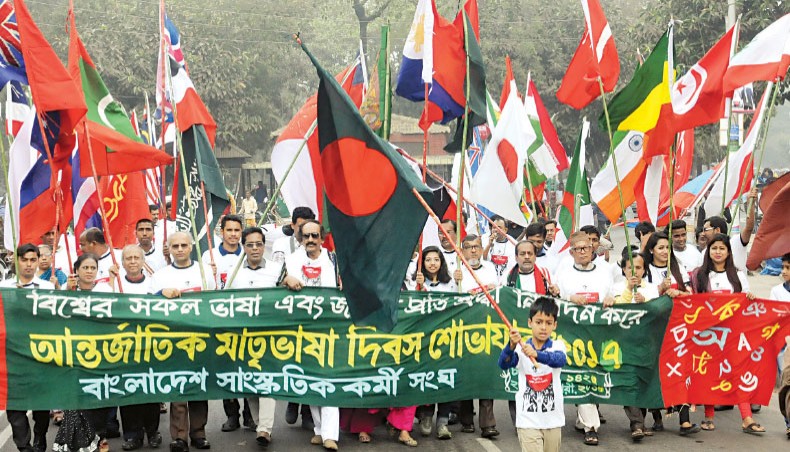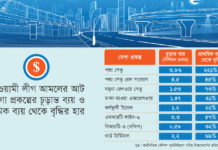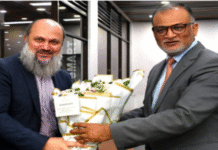Streams of barefooted people from all walks of life began filing past the shaheed minars after placing flowers at the altars across the country at one minute past Monday midnight with the nation paying tributes to the 1952 Language Movement heroes.
People from all walks of life and ages began to gather at the Central Shaheed Minar in the capital and other memorials, mostly at educational institutions and important locations, built to commemorate the heroism and sacrifice of language movement martyrs.
State dignitaries first placed wreaths at the Central Shaheed Minar. Wreaths were placed at the altar of the monument as Amar Bhaiyer Rakte Rangano Ekushey February was sung in chorus.
After the dignitaries had placed wreaths and flowers, the Central Shaheed Minar was opened to people to pay tributes.
Artistes sang patriotic songs and recited poems on the Central Shaheed Minar premises, decorated with Bangla letters against the backdrop of a rising sun.
On February 21, 1952, which fell on Phalgun 8, 1359 on the Bangla calendar, the rulers of the then Pakistan banned any rally or procession to stop protests against the announcement that Urdu would be the only state language of the country even though a majority of the combined population spoke Bangla.
It was the first uprising of Bengalis against the colonial attitude of Pakistani rulers that became the prime inspiration for their struggle for self-determination throughout the 1950s and the 1960s leading to the emergence of the independent Bangladesh through a nine-month War for Independence in 1971.
Ekushey February, known as Shaheed Dibas or Martyrs’ Day, has come to be observed as International Mother Language Day since February 2000 to promote linguistic and cultural diversity and multilingualism after a proclamation by UNESCO general conference in November 1999.
The United Nations, in the light of Sustainable Development Goals, has set the theme of the International Mother Language Day 2017 as ‘Towards Sustainable Futures through Multilingual Education.’
The day is a public holiday.
The national flag is hoisted at half-mast atop government, autonomous and private buildings and black flags are hoisted to pay tributes to the martyrs, including Salam, Jabbar, Rafiq and Barkat who were killed in police firing into a students’ procession brought out defying ban demanding Bangla as a state language in February 1952.
Like the previous years, Dhaka University is supervising the Amar Ekushey observance programmes. Fine arts students decorated the walls around the monument with floral designs. Roads, dividers and islands have been decorated with the national flag and festoons and cardboard cut-outs with Bangla letters.
The Dhaka Metropolitan Police have taken all-out security measures for a smooth observance of Amar Ekushey.
The president, Abdul Hamid, the prime minister, Sheikh Hasina, the leader of the opposition in
parliament, Raushan Ershad, and the Bangladesh Nationalist Party chairperson, Khaleda Zia, issued messages paying rich tributes to the language martyrs.
Abdul Hamid said, ‘Being a source of ceaseless inspiration, Amar Ekushey inspired and encouraged us to a great extent to achieve the right to self-determination and struggle for freedom and war for independence.’
Hasina urged all to join hands with the spirit of the immortal Ekushey sinking all petty differences for the development of the country and upholding the democratic values.
Khaleda said that spirit of Ekushey would inspire the nation to resist all conspiring and dominant forces and restore democratic rights of people.
Political parties and socio economic organisations have taken elaborate programmes marking the day. BNP organised a discussion at the Institute of Engineers Bangladesh in Dhaka Monday and ruling Awami League would hold a discussion at Krishibid Institution in Dhaka.
The state-run Bangladesh Television aired live the observance at the Central Shaheed Minar.
Bangladesh Betar and private television and radio channels are airing special programmes on the occasion. Newspapers published supplements highlighting the significance of the day.
Amar Ekushey is being observed officially in all district and upazila towns while various organisations also placed flowers and wreaths at local shaheed minars. Bangladeshis living abroad are also observing the day, reports reaching Dhaka said.
People from all walks of life and ages began to gather at the Central Shaheed Minar in the capital and other memorials, mostly at educational institutions and important locations, built to commemorate the heroism and sacrifice of language movement martyrs.
State dignitaries first placed wreaths at the Central Shaheed Minar. Wreaths were placed at the altar of the monument as Amar Bhaiyer Rakte Rangano Ekushey February was sung in chorus.
After the dignitaries had placed wreaths and flowers, the Central Shaheed Minar was opened to people to pay tributes.
Artistes sang patriotic songs and recited poems on the Central Shaheed Minar premises, decorated with Bangla letters against the backdrop of a rising sun.
On February 21, 1952, which fell on Phalgun 8, 1359 on the Bangla calendar, the rulers of the then Pakistan banned any rally or procession to stop protests against the announcement that Urdu would be the only state language of the country even though a majority of the combined population spoke Bangla.
It was the first uprising of Bengalis against the colonial attitude of Pakistani rulers that became the prime inspiration for their struggle for self-determination throughout the 1950s and the 1960s leading to the emergence of the independent Bangladesh through a nine-month War for Independence in 1971.
Ekushey February, known as Shaheed Dibas or Martyrs’ Day, has come to be observed as International Mother Language Day since February 2000 to promote linguistic and cultural diversity and multilingualism after a proclamation by UNESCO general conference in November 1999.
The United Nations, in the light of Sustainable Development Goals, has set the theme of the International Mother Language Day 2017 as ‘Towards Sustainable Futures through Multilingual Education.’
The day is a public holiday.
The national flag is hoisted at half-mast atop government, autonomous and private buildings and black flags are hoisted to pay tributes to the martyrs, including Salam, Jabbar, Rafiq and Barkat who were killed in police firing into a students’ procession brought out defying ban demanding Bangla as a state language in February 1952.
Like the previous years, Dhaka University is supervising the Amar Ekushey observance programmes. Fine arts students decorated the walls around the monument with floral designs. Roads, dividers and islands have been decorated with the national flag and festoons and cardboard cut-outs with Bangla letters.
The Dhaka Metropolitan Police have taken all-out security measures for a smooth observance of Amar Ekushey.
The president, Abdul Hamid, the prime minister, Sheikh Hasina, the leader of the opposition in
parliament, Raushan Ershad, and the Bangladesh Nationalist Party chairperson, Khaleda Zia, issued messages paying rich tributes to the language martyrs.
Abdul Hamid said, ‘Being a source of ceaseless inspiration, Amar Ekushey inspired and encouraged us to a great extent to achieve the right to self-determination and struggle for freedom and war for independence.’
Hasina urged all to join hands with the spirit of the immortal Ekushey sinking all petty differences for the development of the country and upholding the democratic values.
Khaleda said that spirit of Ekushey would inspire the nation to resist all conspiring and dominant forces and restore democratic rights of people.
Political parties and socio economic organisations have taken elaborate programmes marking the day. BNP organised a discussion at the Institute of Engineers Bangladesh in Dhaka Monday and ruling Awami League would hold a discussion at Krishibid Institution in Dhaka.
The state-run Bangladesh Television aired live the observance at the Central Shaheed Minar.
Bangladesh Betar and private television and radio channels are airing special programmes on the occasion. Newspapers published supplements highlighting the significance of the day.
Amar Ekushey is being observed officially in all district and upazila towns while various organisations also placed flowers and wreaths at local shaheed minars. Bangladeshis living abroad are also observing the day, reports reaching Dhaka said.
Source: New Age










